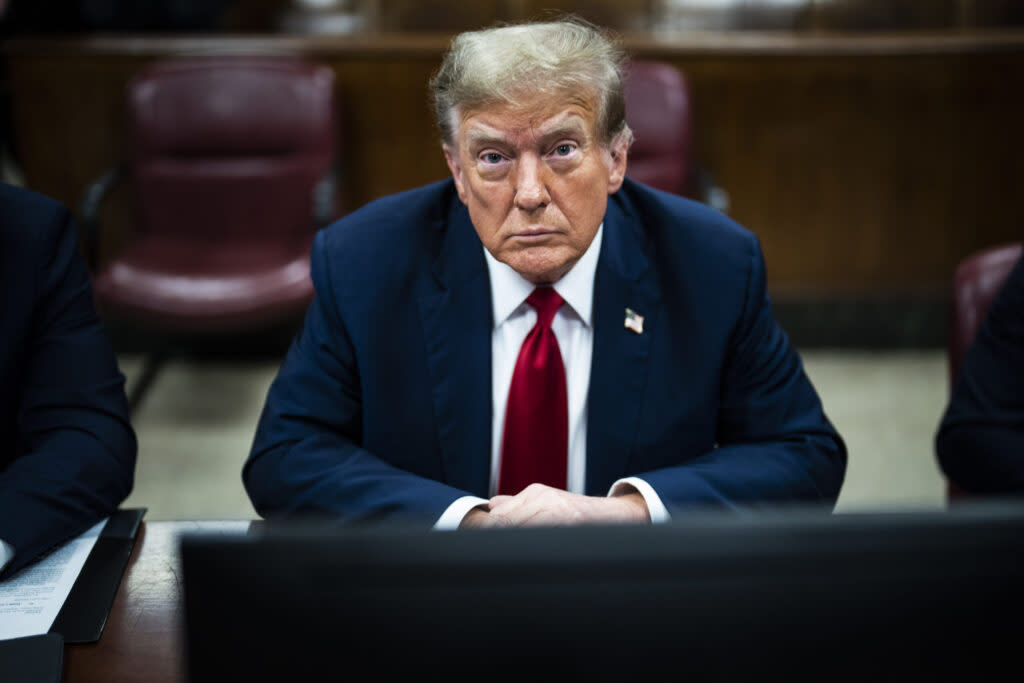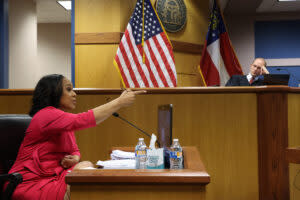Trump’s trial is already putting a spotlight on threats to women

- Oops!Something went wrong.Please try again later.
Former U.S. President Donald Trump appears ahead of the start of jury selection at Manhattan Criminal Court on April 15, 2024 in New York City. Former President Donald Trump faces 34 felony counts of falsifying business records in the first of his criminal cases to go to trial. (Jabin BotsfordGetty Images, Pool)
Just two days after Juror No. 2 had been selected to sit on the jury of one of the most high-profile trials in modern history, she wanted off.
If the woman’s phone and the incoming messages from family, friends and co-workers were any indication, people had figured out that she was set to weigh in on the first criminal trial of a former U.S. president — a president who regularly attacks people he views unfavorably, spurring his many followers to do the same.
This report was originally published by The 19th. The Illuminator is a member of The 19th News Network.
Before being excused, Juror No. 2 told the presiding judge: “I definitely have concerns now, one of them especially being the aspects of my identity have already been out there in public. … I don’t believe, at this point, I can be fair and unbiased.”
With the start of former President Donald Trump’s unprecedented criminal trial this week, there was an inescapable spotlight on the effect of potential threats to those involved in the case. But the ways in which women could face the brunt of it were particularly on display.
Ahead of the trial, Trump repeatedly criticized a woman related to the judge overseeing the case. And the mere prospect of being identified as a juror in the trial — and the potential online harassment and other threats that could come with that — led at least two women to publicly express concern or hesitation about further participation. Trump’s behavior is part of a pattern, with appeals to voters often based in misogyny and the targets of his indignation often women, experts said.
“We live in a society in which violence against women is unchecked and normalized,” said Juliet A. Williams, a professor of gender studies at the University of California, Los Angeles. “Women on the jury may have more experience with bullying, being threatened, especially being victims of violence — and so less willing to put themselves in the bullseye of that.”
The court proceedings — which involve allegations that Trump falsified business records to make hush money payments to adult film actor Stormy Daniels to hide information from voters ahead of the 2016 election — kicked off Monday with several days of jury selection. By Friday, 12 jurors and six alternates had been selected; their names are not being revealed publicly.
The jury selection process included dismissals on Thursday of two people who had initially been seated, including the woman who was excused after expressing concern that her identity could be revealed. On Friday, a woman who was dismissed during questioning said she has “bad anxiety” and worried about people finding out of her involvement in the trial. Another burst into tears, adding: “This is so much more stressful than I thought it was going to be,” before she was excused.
Williams said it’s reasonable for any juror to fear being targeted by Trump and his supporters, particularly if the verdict doesn’t go the way they wish.
“The reason why women and people of color on the jury sitting alongside White men — even White women — should feel more concerned is that this is a politician who has built a base based on overt and unapologetic misogyny and racism,” she said.
The trial has already shown how even an indirect connection to the proceedings can trigger Trump’s ire.
GET THE MORNING HEADLINES DELIVERED TO YOUR INBOX
In the weeks before the start of the trial, the former president posted criticism repeatedly online about not just Juan Merchan, the judge overseeing the case, but his adult daughter. Trump pointed out the daughter’s work for a firm with ties to top Democrats, calling her a “Rabid Trump Hater” and claiming he will not get a fair trial. He has also spread false information about her social media activity.
A pro-Trump demonstrator who gave his name as “Hungry Santa” outside Manhattan Criminal Court on April 15, 2024. (Zachary Roth/States Newsroom)
Trump had previously tried to bring up her work in an effort to get her father disqualified from the case, but a legal advisory committee last year denied the request and concluded the judge’s impartiality cannot “reasonably be questioned” based on a relative’s business or political activities.
Merchan responded to the online attacks by expanding an existing gag order on Trump, who had already been barred from making public statements about witnesses, jurors and others connected with the case, to include some family members.
“This pattern of attacking family members of presiding jurists and attorneys assigned to his cases serves no legitimate purpose,” Merchan wrote. “It merely injects fear in those assigned or called to participate in the proceedings that not only they, but their family members as well, are ‘fair game,’ for Defendant’s vitriol.”
Trump’s campaign and attorneys have argued that the restrictions prevent the former president from engaging in political speech. He could face a fine or jail time for violating the gag order. Merchan is already expected next week to review requests from prosecutors to hold Trump in contempt for several alleged violations.
Sarah Sobieraj, an associate professor of sociology at Tufts University and the author of “Credible Threat: Attacks Against Women Online and the Future of Democracy,” said the growing threat of doxxing — when someone’s personal information including home address, email and phone number is shared online — heightens this moment.
“If these things get released, they become dangers to physical safety,” she said. There’s a threat of random abuse but also one of coordinated attacks, “where there are groups that say, ‘OK, let’s make this person’s life absolutely miserable.”
Women have also been a central force in many of Trump’s legal entanglements — and as a result, a target of his anger. Last year, a jury found Trump guilty of sexually abusing and defaming the writer E. Jean Carroll, who accused Trump of wrongdoing in a pair of trials.
Trump has also criticized Fani Willis, the Fulton County, Georgia, district attorney who is overseeing an election interference case against the former president, and Letitia James, the New York attorney general who prosecuted Trump for engaging in business fraud. These prosecutors — both Black women — have seen a heightened level of attacks against them.
Williams said the law has played a “critical role” in the struggle for gender equality in this country, and it’s no surprise women are leading that front.
“It’s not an accident that these issues become the flashpoint for a candidate whose MAGA ideology is at its core intent on turning back the clock on equality for women,” she said, noting Trump’s support for overturning the Roe v. Wade ruling that protected federal abortion rights. “You do have to ask, why does Trump have so much pull? So much traction? And it’s because gender politics matters to everyone.”
On Wednesday, after two days of jury selection, Fox News host Jesse Watters highlighted each selected juror on air and shared publicly known information about them, including general information they had shared about where they lived and worked.
Later, on his Truth Social account, Trump posted Watters’ critical remarks.
Fulton County District Attorney Fani Willis speaks from a witness stand in front of Fulton County Superior Judge Scott McAfee during a hearing in February. (Alyssa Pointer-Pool/Getty Images)
Merchan on Thursday ordered reporters covering the trial to not disclose information about potential jurors’ current or former employers or physical descriptions.
“There is a reason why this is an anonymous jury and why we have taken the measures that we have taken and it kind of defeats the purpose of that when so much information is put out there that is very, very easy for anyone to identify who the jurors are,” he said, according to multiple reports.
Sobieraj worries what this will all mean for civic participation in areas not just like jury duty but also when working an election as a poll worker or being on a school committee.
“The lack of accountability around online abuse and harassment and sort of mob treatment that we have right now is making civic life pretty unappealing, especially for people from underrepresented groups who tend to receive more of that abusive harassment,” she said.
The trial, which marks the first time a former president is being tried on criminal charges, is expected to last about two months. Trump faces 34 counts of falsifying business records in a case that Manhattan District Attorney Alvin L. Bragg has said is ultimately about Trump’s attempt to hide information from voters, potentially swaying the results of the 2016 election.
Among the people expected to testify is Daniels, who claims she had a brief affair with Trump in 2006. Trump, who is accused of reimbursing his former lawyer Michael Cohen for payments he made to Daniels, has repeatedly denied wrongdoing. He has also lashed out publicly at Daniels over several years.
Trump has been in the courtroom during jury selection, reportedly watching prospective jurors answer a questionnaire that will help determine whether they can be seated.
On Tuesday, Merchan accused Trump of intimidating a potential juror. He instructed one of Trump’s lawyers to speak with his client.
“He was audibly gesturing, speaking in the direction of the juror,” Merchan said in court. “I won’t tolerate that. I will not have any jurors intimidated in this courtroom. I want to make that crystal clear.”
Dozens of people have been dismissed in the first week of the trial after saying they could not be impartial. Merchan said he expects opening statements to begin next week.
Trump faces several dozen charges in multiple cases involving not just allegations of falsifying business records but also interfering in elections and hiding classified information. The timing of Trump facing these trials, in the midst of running for president again, is unclear. The U.S. Supreme Court is also scheduled to hear oral arguments this month in a case that will determine whether he is immune from criminal prosecution on charges that he tried to overturn the 2020 election.
The post Trump’s trial is already putting a spotlight on threats to women appeared first on Louisiana Illuminator.



